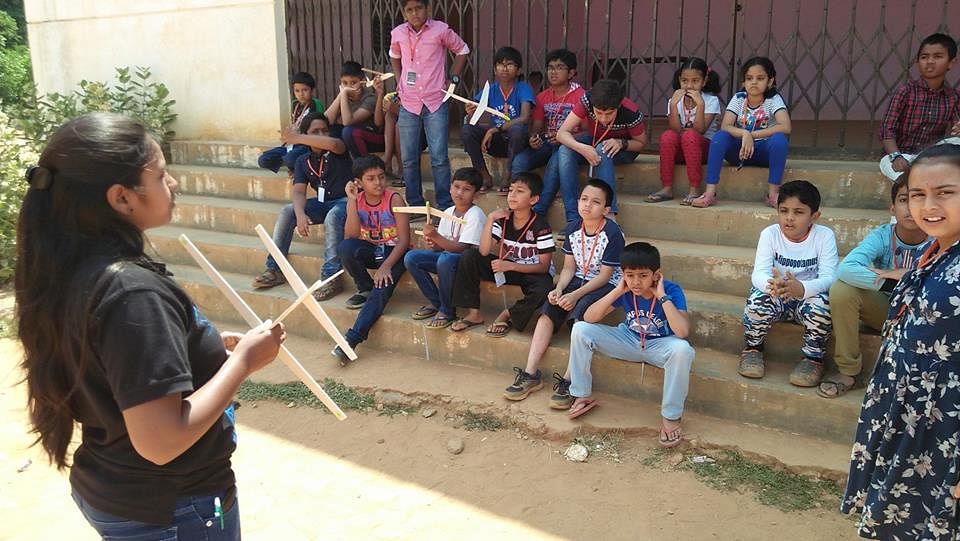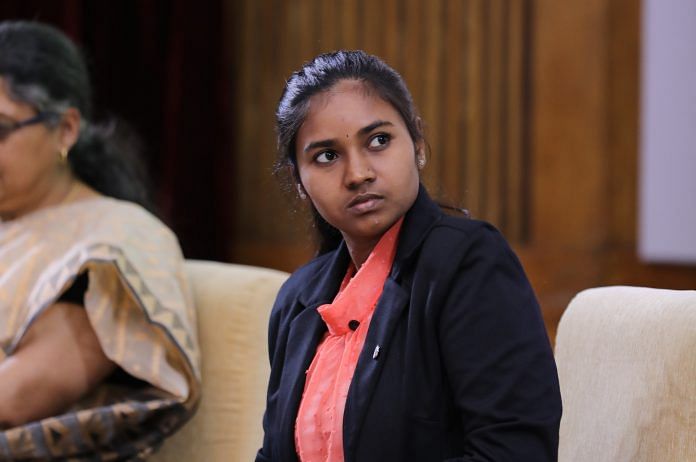Bengaluru: With each passing year, humans are increasingly making their presence felt in space and the satellite industry. But this also makes it more imperative to understand how space works and how satellites function. This is the vision that 23-year-old entrepreneur Nikhitha C. had when she co-founded the successful Society for Space Education Research and Development (SSERD), based out of Bengaluru.
SSERD works in the field of space education and outreach in India and abroad, and has trained numerous students in subjects related to space.
Nikhitha is also a recipient of the Kalpana Chawla Scholarship Fund awarded by the prestigious International Space University (ISU) in Europe, where she has been selected for the coveted Executive Space Course this year.
Space revolution
Nikhitha graduated with a bachelor’s degree in aerospace engineering from Alliance University in Bangalore in 2017. In college, she started a space club in January 2016, where she taught students subjects like model rocketry. Since the club was so successful, Nikhitha was keen to expand it into a space outreach group for students.
“We have had periodic revolutions throughout history. This time, it’s the space revolution,” she says. “When the IT revolution came along, it became important for everyone to know how to use a computer. In order to benefit from the space revolution, everyone should know and understand space.”
A year before graduation, at a conference, she met entrepreneur Sujay Sreedhar, who shared her vision for space education. They both decided to work together on extending the space club outside her college premises. They not only actively sought out space education opportunities, but also started conducting space camps similar to the well-known ones organised by NASA.
“It costs several lakhs to attend, and students miss out on it because of that,” Nikhitha says. “So we offered a similar alternative here.”
Helping students
The duo established SSERD as a non-profit organisation in January 2016, and registered it in Kerala, after attempts to register in Karnataka went nowhere. SSERD also often acts as a career guide for students interested in space, so they don’t unknowingly end up with an irrelevant engineering degree just because it’s the norm.
They’ve also helped students build final-year projects for college, such as model rockets, remote-controlled airplanes, and CanSats — satellites the size of a soda can, which do not enter orbit but transmit data back to Earth as they climb up.
“A lot of students tend to think satellites are really big and can’t be built by students,” she explained. “We wanted to show them they can.”
Also read: On International Day of Women and Girls in Science, remembering the 5 early pioneers
Their education outreach also proved very successful. Three private schools in Bengaluru signed SSERD up to teach a new subject, space, which will be in the curricula from the next academic year. The group also works with the Akshaya Patra Foundation, which helps underprivileged children to be taught science and technology.

SSERD has about 200 volunteers and three other full-time employees apart from co-founders Nikhitha and Sujay. Several volunteers are students who are still in school or college, some are working, while others are researchers or professors.
One of SSERD’s most noteworthy achievements was helping school students build a payload that could be launched from a high altitude balloon and measure stratospheric ozone; the students went on to publish a research paper from the findings.
The team is now working on an astrobiology project for a high school student, where microbes and planets will be taken to a height of 30 km through a high-altitude balloon and exposed to radiation. Once the organic material is back on Earth, it will be studied for changes. The project is in collaboration with the Indian Institute of Astrophysics, which will help with the launch.
International projects
SSERD isn’t confined to India — one of its student projects was with a college in Africa which wanted to build a satellite that could climb to over 9 km. Nikhitha’s team helped design this satellite.
SSERD now has an established branch in the Philippines. While initial lectures and classes used to take place online for about 50 people, the team was besieged with requests from hundreds of students. So, it set up a team of teenagers initially taught by Nikhitha, who are now delivering lectures all over the Philippines.
Nepal is next up for a similar extension, and The Netherlands is possibly in line as well.
Back to studying
Nikhitha travels internationally for her projects and for SSERD’s space education, often delivering lectures at schools and colleges. It was at one such lecture that Nikhitha encountered people who helped make a decision that would lead her back to school.
“I was invited by the Space Generation Advisory Council (SGAC) to Mauritius last December, to teach space science to students there,” she said. The SGAC is a global, non-governmental, non-profit organisation, working as part of the United Nations Programme on Space Applications, to include young space professional representatives in industry and the UN.
While in Mauritius, Nikhitha was encouraged by other international attendees to apply for the Executive Space Course at the International Space University. It’s a nine-week summer executive programme for people working in the space sector. The institute is funded and supported by the likes of European Commission, the government of Estonia, the French Air Force, Airbus, Lockheed Martin, the European Space Agency, NASA, and even the Indian Space Research Organisation, ISRO.
The course takes place at a different university in Europe each year, and is in France this year. It covers space science, policy, entrepreneurship, engineering, arts (like cinematography), and more, with a global intake of 100 students per batch. Students come from diverse backgrounds, including finance, law, marketing, etc., and have a relevant degree.
Also read: Two Indian journalists are bringing the women of science to life
Nikhitha also received the Dr Kalpana Chawla scholarship fund, which the ISU awards to one female student from India each year — this year, for a change, the scholarship is split between two candidates: Nikhitha and Aditi Nilvarna from Mumbai. The scholarship was established with the intention of developing strong technical and space leadership qualities in talented Indian women.
“We’ll have common courses for the first three weeks,” Nikhitha explained. “The next three are specialisations and the last three is when we’ll do a project.”
The future
Nikhitha has plenty of plans for the still-bootstrapped SSERD once she’s done with the course. The Kerala government has expressed interest in including space as a part of some schools’ curricula, and she also is hoping to launch space clubs in tier-2 and tier-3 cities, to increase outreach to those who won’t otherwise be exposed to space science and technology.




Space news and research is a ubiquitous element and it is need of the hour that government include it is school curriculum.
Kudos to Nikita. At such young age,she is teaching space sciences to the children all over the world. Well it’s true A hole can be made in sky if you have the grit and determination.